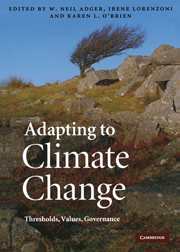Book contents
- Frontmatter
- Contents
- List of contributors
- Preface
- 1 Adaptation now
- Part I Adapting to thresholds in physical and ecological systems
- Part II The role of values and culture in adaptation
- 9 The past, the present and some possible futures of adaptation
- 10 Do values subjectively define the limits to climate change adaptation?
- 11 Conceptual and practical barriers to adaptation: vulnerability and responses to heat waves in the UK
- 12 Values and cost–benefit analysis: economic efficiency criteria in adaptation
- 13 Hidden costs and disparate uncertainties: trade-offs in approaches to climate policy
- 14 Community-based adaptation and culture in theory and practice
- 15 Exploring the invisibility of local knowledge in decision-making: the Boscastle Harbour flood disaster
- 16 Adaptation and conflict within fisheries: insights for living with climate change
- 17 Exploring cultural dimensions of adaptation to climate change
- 18 Adapting to an uncertain climate on the Great Plains: testing hypotheses on historical populations
- 19 Climate change and adaptive human migration: lessons from rural North America
- Part III Governance, knowledge and technologies for adaptation
- 31 Conclusions: Transforming the world
- Index
- References
14 - Community-based adaptation and culture in theory and practice
Published online by Cambridge University Press: 31 August 2009
- Frontmatter
- Contents
- List of contributors
- Preface
- 1 Adaptation now
- Part I Adapting to thresholds in physical and ecological systems
- Part II The role of values and culture in adaptation
- 9 The past, the present and some possible futures of adaptation
- 10 Do values subjectively define the limits to climate change adaptation?
- 11 Conceptual and practical barriers to adaptation: vulnerability and responses to heat waves in the UK
- 12 Values and cost–benefit analysis: economic efficiency criteria in adaptation
- 13 Hidden costs and disparate uncertainties: trade-offs in approaches to climate policy
- 14 Community-based adaptation and culture in theory and practice
- 15 Exploring the invisibility of local knowledge in decision-making: the Boscastle Harbour flood disaster
- 16 Adaptation and conflict within fisheries: insights for living with climate change
- 17 Exploring cultural dimensions of adaptation to climate change
- 18 Adapting to an uncertain climate on the Great Plains: testing hypotheses on historical populations
- 19 Climate change and adaptive human migration: lessons from rural North America
- Part III Governance, knowledge and technologies for adaptation
- 31 Conclusions: Transforming the world
- Index
- References
Summary
Introduction
This chapter explores the relationship between culture and adaptation in theory and practice. Our aim is to make clear the important role that culture plays in enabling adaptation, and show how community-based adaptation is well placed to promote, rather than challenge, individual and shared concepts of well-being.
Our intention is to step back from the typical jumping-off point for ‘good development’, which emphasises community participation, and to unpack the relationships between individual well-being, culture, community and adaptation. To this end, we commence with a brief review of the principles of community-based adaptation, before exploring its relationship to notions of the individual, community and culture taken from political philosophy. In particular, we rely on thinking that has emerged from debates over the role of culture and community in the life of the individual that have emerged from attempts to resolve liberal (predominantly individualist) and communitarian (community focused) views of society.
This body of work is instructive as it reveals, first, the importance of culture to individual well-being, and second, the limits that culture places on the freedom of individuals and communities to embrace change. In the final section, the implications of this understanding for community-based adaptation are drawn out through examples of Practical Action's experiences, demonstrating how the ‘community based’ approach is able to recognise and respond to the different roles that culture assumes in adaptation.
- Type
- Chapter
- Information
- Adapting to Climate ChangeThresholds, Values, Governance, pp. 227 - 239Publisher: Cambridge University PressPrint publication year: 2009
References
- 9
- Cited by



